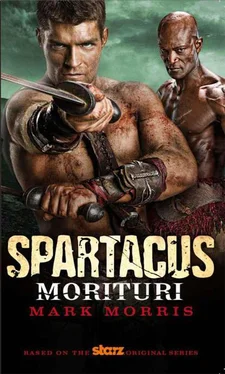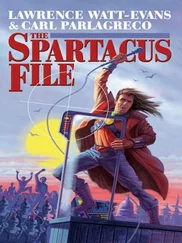Mark Morris - Spartacus - Morituri
Здесь есть возможность читать онлайн «Mark Morris - Spartacus - Morituri» весь текст электронной книги совершенно бесплатно (целиком полную версию без сокращений). В некоторых случаях можно слушать аудио, скачать через торрент в формате fb2 и присутствует краткое содержание. Жанр: Исторические приключения, на английском языке. Описание произведения, (предисловие) а так же отзывы посетителей доступны на портале библиотеки ЛибКат.
- Название:Spartacus: Morituri
- Автор:
- Жанр:
- Год:неизвестен
- ISBN:нет данных
- Рейтинг книги:5 / 5. Голосов: 1
-
Избранное:Добавить в избранное
- Отзывы:
-
Ваша оценка:
- 100
- 1
- 2
- 3
- 4
- 5
Spartacus: Morituri: краткое содержание, описание и аннотация
Предлагаем к чтению аннотацию, описание, краткое содержание или предисловие (зависит от того, что написал сам автор книги «Spartacus: Morituri»). Если вы не нашли необходимую информацию о книге — напишите в комментариях, мы постараемся отыскать её.
Spartacus: Morituri — читать онлайн бесплатно полную книгу (весь текст) целиком
Ниже представлен текст книги, разбитый по страницам. Система сохранения места последней прочитанной страницы, позволяет с удобством читать онлайн бесплатно книгу «Spartacus: Morituri», без необходимости каждый раз заново искать на чём Вы остановились. Поставьте закладку, и сможете в любой момент перейти на страницу, на которой закончили чтение.
Интервал:
Закладка:
Leaving the cells behind, they began to walk up the tunnel toward the gates. Already they could hear the noise of the crowd rising in volume, a rumble of speculative chatter, laced with an almost palpable sense of excitement for the main event of the day. As yet the gates were nothing but a distant blur of diffuse light, but as they neared the arena’s entrance, the light became both brighter and more distinctive, the thick crosshatched mesh of the gates acquiring a vast and forbidding solidity. Spartacus saw Oenomaus standing against the wall to the right of the gates, waiting for them. His tall, lean, long-limbed frame was as straight-backed as ever, and his face a mask of dignity, pride, icy focus and grim determination, as if it was he, and not the men he had trained with such dedication, who was about to step out once more on to the sands.
On Doctore’s opposite side, standing against the left-hand wall like his evil reflection, was Mantilus. Spartacus stared at him, stony-faced. Though not an essential element of dominus’s preparations for the day, they had all been hoping that the grim creature would assume his position by the gates, just as he had done during the previous games. Yellow light filtered through the diamond-shaped gaps between the criss-crossing strips of iron mesh, fell across his scarred body, giving his skin a scaly, lizard-like texture. Indeed, with his milky-white eyes he looked like some nocturnal animal-a reptile or an insect-which had crawled out from between the dank, dark cracks in the stone walls and was now poised, motionless, waiting for a time when it would either pounce upon passing prey or slither back into hiding.
With absolute deliberation, Spartacus walked up to Mantilus and stood before him, their faces no more than a few inches apart. He stared, unblinking, into Mantilus’s white eyes, just as he had done on the night when Batiatus and Lucretia had staged a celebration at their villa to welcome Hieronymus and Crassus to Capua.
Several moments passed in utter silence, Spartacus unflinching in his appraisal of the man indirectly responsible for the deaths of several of Batiatus’s gladiators in the previous games, Mantilus unresponsive, as if unaware of Spartacus’s presence.
“Do you see me, sorcerer?” Spartacus whispered with derision. “Do you observe eyes gazing into soul?”
Mantilus said nothing, did not even so much as twitch a facial muscle in response, and after a moment Oenomaus said quietly, “Spartacus.”
Spartacus turned away from Mantilus and stood shoulder to shoulder with Varro before the gates.
“You have no need of my words,” Oenomaus rumbled. “You both know what must be done.”
Varro nodded, but, like Mantilus, Spartacus offered no response. He simply stood, a sword hanging loosely in each hand, his eyes looking straight ahead.
As the curved horns sounded their fanfare, two Roman soldiers stepped forward, and, with all due ceremony, hauled the massive iron gates slowly open. Spartacus and Varro paused a moment, waiting for Solonius, up in the pulvinus, to complete his introductions, and then they strode out on to the sands. From the way the crowd greeted them, clapping their hands, stamping their feet, and bellowing out Spartacus’s name over and over, until it became a single chanting voice that boomed echoingly around the entire stadium, it seemed that the popularity of Capua’s champion had been affected not at all by his previous lackluster victory in the arena, despite rumors to the contrary. But as usual Spartacus seemed utterly unmoved by the laurels heaped upon his head. From the look in his diamond-chip eyes, it was as if the crowd might not even have been there at all.
Once the gladiators were out on the sands, the soldiers who had opened the gates pushed them slowly and creakingly closed again. They left just enough of a gap to slip through, and then they stepped into the tunnel and pulled on the gates until they met with a resounding clang of metal. One of the soldiers then stepped forward with a huge key and locked the gate, after which the two of them sauntered away up the tunnel-though not before the one with the key had first given Oenomaus a dismissive and disdainful glance.
Once they had gone, Mantilus pushed himself away from the wall like a living shadow and drifted silently up to the gate again. He hooked his fingers through the mesh as before and resumed his silent vigil, his lips moving constantly and silently.
Oenomaus waited until he was in position and then he too stepped forward. This time, however, instead of standing next to the scarred attendant, with the tip of his nose almost touching the metal of the gate to afford him the best possible view of proceedings in the arena, he quietly and deliberately stood a couple of paces behind him, legs slightly apart, hands hanging loosely at his sides.
Spartacus and Varro walked a third of the way into the arena, their strides long and easy, their demeanor deceptively casual. Eventually they came to a halt and looked, with equal indifference, around them. To their left, perhaps forty paces away, were Solonius’s men, a hoplomachus, with his spear and his short sword, and a thraex, clutching a sica and a short rectangular shield, his visored, wide-brimmed helmet crested with the head of a griffin. Directly facing them, again around forty paces away, were Hieronymus’s gladiators-a retiarius, with his net and trident, and a secutor, who compensated for the limited range of vision through the round eye holes in his egg-shaped helmet by having a large rectangular shield with which to protect himself, and a longer than average stabbing sword.
For several seemingly interminable seconds all six gladiators in their three pairs regarded one another, standing as if on the points of a large invisible triangle. The crowd, quietening a little now, watched expectantly, waiting to see who would make the first move.
With an almost lazy turn of the head, Spartacus looked at Solonius’s gladiators, who looked back at him with no apparent malice, their shields only half-raised, their weapons pointing toward the ground. If they gave any kind of signal, it was not immediately obvious to those looking down from above-but suddenly Spartacus raised both his swords and began to run toward Hieronymus’s men, slowly at first, but quickly gaining speed as he covered the distance between them.
When he was around twenty paces away, he let loose a blood-curdling battle cry, full of rage and venom, which was immediately taken up by the crowd. Both Hieronymus’s men-belying their supposed status as savage and fearless Morituri -took a stumbling step back, clearly unnerved by the sheer ferocity of his lone attack.
As he closed with them, the retiarius rallied slightly, adopting a fighting stance and casting his net with one sweep of his arm, hoping to ensnare Spartacus within its barbed mesh. Spartacus, however, was far too quick for him. As the net first billowed through the air toward him, and then began to sink back down to earth, he crossed his swords in front of his chest and dived into a forward roll, his body passing completely beneath the descending net.
Before the retiarius even seemed to realize what had happened, Spartacus had closed the remaining distance between them. Springing back to his feet, he uncrossed his arms in a single blur of movement, the swords in his hands slashing out in a double-arc of sun-white metal. His right-handed blade cut the Retiarius’s legs from under him-literally-whereas the one in his left went a little higher, opening a long slash across his opponent’s unprotected stomach.
The retiarius didn’t even have time to scream before he was falling, his legs, hacked off just beneath the knees, flying one way, and his body the other. As he hit the ground with a heavy thud, his slashed belly burst open like a paper bag and blood and slippery internal organs gushed out of him.
Читать дальшеИнтервал:
Закладка:
Похожие книги на «Spartacus: Morituri»
Представляем Вашему вниманию похожие книги на «Spartacus: Morituri» списком для выбора. Мы отобрали схожую по названию и смыслу литературу в надежде предоставить читателям больше вариантов отыскать новые, интересные, ещё непрочитанные произведения.
Обсуждение, отзывы о книге «Spartacus: Morituri» и просто собственные мнения читателей. Оставьте ваши комментарии, напишите, что Вы думаете о произведении, его смысле или главных героях. Укажите что конкретно понравилось, а что нет, и почему Вы так считаете.












